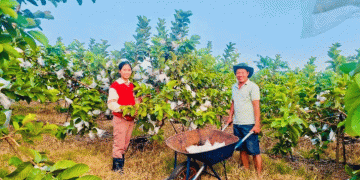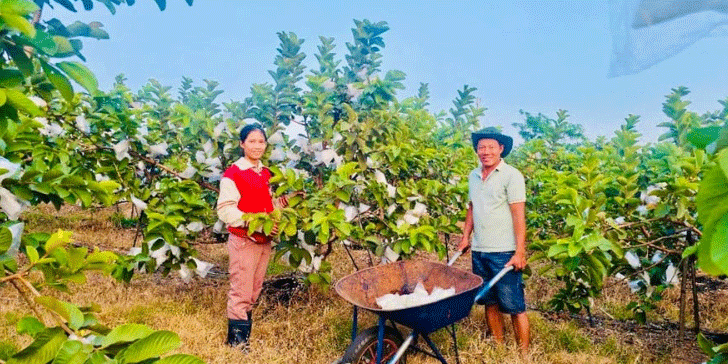Nearly six years after transitioning from vegetable farming to ruby guava cultivation, Nguyen Thi Yen’s family (Dak Po District, Yang Bac Commune, Cho Kotu Dak Yang Village) has secured a stable and lucrative income. By adopting organic farming methods, her guava products earned a 3-star OCOP (One Commune One Product) certification—a first for fruit cultivation in the area in 2024.
According to Dinh Huu Bu, Vice Chairman of Yang Bac Commune People’s Committee, Yen’s 1-hectare guava farm serves as a pioneering model for sustainable fruit production. Beyond her own success, Yen actively shares her expertise with other households, helping them adopt organic practices and secure stable earnings.
Sustainable Techniques for High-Quality Guava
Yen and her husband initially grew vegetables but faced unstable profits. In 2019, inspired by successful guava growers in western regions, they purchased 100 ruby guava seedlings for trial planting. Seeing the trees thrive in local conditions, they expanded to full-scale organic farming by mid-2020.
Their key techniques include:
- Organic Fertilization: Using a mix of biological products and cow manure for soil nutrition.
- Natural Pest Control: Homemade sprays from chili, alcohol, and ginger to deter insects.
- Fruit Bagging: Covering guavas with specialized bags (when fruits reach 2.5–3 cm diameter) to prevent pest damage.
“This method is labor-intensive but eliminates pesticide costs. The guavas are crisp, sweet, and safe for consumers,” Yen explained.
Higher Yields, Higher Profits
To maximize productivity, Yen prunes excess fruits early, allowing trees to focus nutrients on fewer, higher-quality guavas. This also stimulates continuous flowering, ensuring year-round harvests.
Annual Production & Income:
- Yield: ~20 tons/year
- Selling Price: 14,000–18,000 VND/kg (~0.56–0.56–0.72/kg)
- Net Profit: 250 million VND/year (~$10,000)
Yen’s guavas are in high demand, with bulk orders from Binh Dinh Province and Ho Chi Minh City. To stabilize supply, she mentors 7 local households in organic methods and guarantees product purchases, ensuring their economic stability.
Community Impact & Future Prospects
Farmers like Nguyen Van Hung (Cho Kotu Dak Yang Village) credit Yen’s guidance for their success:
“Thanks to her training, I effectively manage 4 sao (~0.13 hectares) of guava. My farm produced over 1 ton, all purchased by Yen.”
Nguyen Dinh Nho, Vice Chairman of Dak Po District Farmers’ Association, highlights that the district now has 300 hectares of fruit trees (guava, dragon fruit, longan). Yen’s model demonstrates how organic practices enhance both product value and market competitiveness.
A Blueprint for Sustainable Farming
Nguyen Thi Yen’s story proves that organic ruby guava farming is not only profitable but also scalable and eco-friendly. By prioritizing natural inputs, precision pruning, and community collaboration, smallholders can achieve higher yields, premium pricing, and sustainable income.
For agronomists and farmers, this case underscores:
Organic certification (OCOP) boosts market value.
Natural pest control reduces costs and health risks.
Knowledge-sharing strengthens local supply chains.































